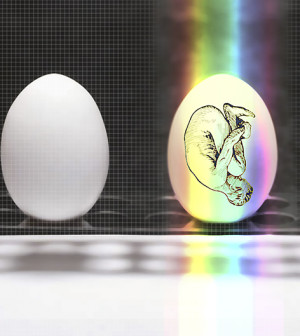- Could Artificial Sweeteners Be Aging the Brain Faster?
- Techniques for Soothing Your Nervous System
- Does the Water in Your House Smell Funny? Here’s Why
- Can a Daily Dose of Apple Cider Vinegar Actually Aid Weight Loss?
- 6 Health Beverages That Can Actually Spike Your Blood Sugar
- Treatment Options for Social Anxiety Disorder
- Understanding the Connection Between Anxiety and Depression
- How Daily Prunes Can Influence Cholesterol and Inflammation
- When to Take B12 for Better Absorption and Energy
- Epsom Salts: Health Benefits and Uses
Obese Teens Less Likely to Use Birth Control


Sexually active teenage girls who are obese are less likely to use birth control than teens who aren’t overweight, a new study reports.
What’s more, those overweight teens who do use some form of contraception are less likely than their normal-weight peers to use it regularly, the researchers said. In both cases, obese teens are at greater risk for an unintended pregnancy, the research from the University of Michigan found.
“The U.S. teen pregnancy rate is one of the highest in the developed world and we know pregnant adolescents are more likely to have poor birth outcomes,” said the study’s lead author, Dr. Tammy Chang, an assistant professor of family medicine at the U-M Medical School and a member of the U-M Institute for Healthcare Policy and Innovation, in a university news release.
“Reducing adolescent pregnancy is a national public health priority and we need to understand which adolescents are at higher risk of pregnancy. Our findings suggest that obesity may be an important factor associated with adolescent women’s sexual behavior,” she added.
The study was published July 1 in The Journal of Pediatrics.
The study involved 900 young women between 18 and 19 years old who wrote weekly journal entries on their sexual activities and use of birth control. The researchers used these journals to see whether the teens’ weight influenced their sexual behavior.
The study didn’t find any differences in other sexual behaviors between obese teens and their normal-weight peers, such as how often the teens had sex or how many partners they had.
The researchers suggested that low self-esteem might prevent obese teens from asking their doctor or pharmacist for contraceptives. And certain risk factors associated with obesity, such as the ability to understand basic health information, could also play a role, they noted.
“By understanding the barriers that put certain groups of teens at higher risk of unintended pregnancies, clinicians and researchers can tailor interventions to empower adolescents to make healthier sexual choices,” Chang said.
In the United States, one in four women gets pregnant at least once in her teens. Women who give birth as teens have a higher risk of adult obesity, previous research found.
Obesity during pregnancy is also associated with serious complications, including gestational diabetes, high blood pressure, blood clots, Cesarean-sections, stillbirths and birth-related injuries.
“Understanding sexual behaviors by weight status among adolescents is critical because of the risk of dangerous outcomes for moms and babies associated with obesity,” said Chang.
More information
The U.S. Department of Health and Human Services has more on contraceptive use among teens.
Source: HealthDay
Copyright © 2026 HealthDay. All rights reserved.










